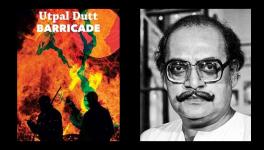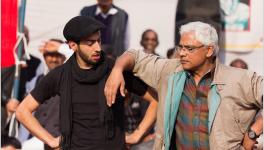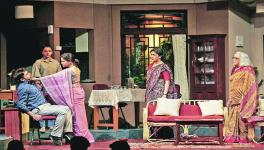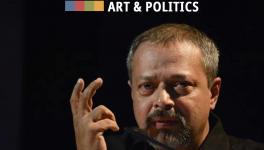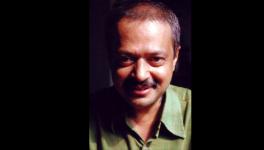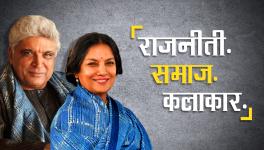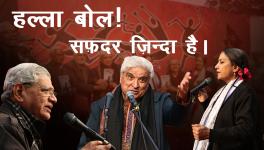Memories of Tanvir Saheb
Recently at Studio Safdar, Nageen Tanvir and the Naya Theatre Mandali sang old, rare songs penned by Habib Tanvir. Also, extracts from Tanvir saheb's memoirs in Urdu were read by members of Janam. In this freewheeling chat, Sudhanva Deshpande and Nageen Tanvir remember the life and times of legendary theatre artist and activist Habib Tanvir in the context of the recently launched English translation of his memoirs.
Transcript:
Sudhanva Deshpande (SD): He was born in 1923, and went on to become one of the preeminent theatre persons of India. I am talking about Habib Tanvir. He was an actor, director, playwright, musician, singer, teacher and philosopher of the theatre. We are delighted here, at “May Day,” to have with us Nageen Tanvir, his daughter, and a singer in her own right, a musician in her own right. And the occasion is the publication of Habib Tanvir's “Memoirs.” So tell us a little bit about this book. This is really the first volume, isn't it?
Nageen Tanvir (NT): Yes.
SD: And when did he started writing it?
NT: He started writing at the age of 81 after my mother passed away.
SD: This was in 2006.
NT: 2006, yes.
SD: And he wanted to do what-- three volumes?
NT: Yes, three volumes.
SD: Of which he ended up writing how much?
NT: One and a half.
SD: One and a half. So the first volume has been translated into English.
NT: Yes.
SD: And is there with us. Habib Saheb was also-- and those of us who came in contact with him, we know that he was a great story teller.
NT: Hmm.
SD: He was a great raconteur.
NT: Yes.
SD: Wasn't he?
NT: Yes. Yes.
SD: And we'll be reading today some small...short excerpts from the Urdu version--
NT: Yes.
SD: --not from the English version.
NT: Yes.
SD: And that has the quality of almost listening to Habib Saheb speaking. What I found very lovely about the book is that... is that the way he spoke is the way he wrote.
NT: Yes.
SD: And that actually is a special quality because what happens-- what tends to happen very often is when you start writing your prose starts to become very formal. That's not the impression one gets here. One gets the impression that these are stories that...
NT: And they were very graphic.
SD. They are very graphic. Absolutely. Absolutely.
NT: You can see, you can visualize what you read.
SD: Absolutely. Habib Tanvir also lived a full life. It's a life full of colour, a great joy but also of sadness.
NT: Yes.
SD: And some of that also comes through in the book. As a daughter what's been your reaction to the way in which he writes-- very candidly about personal aspects.
NT: I think it's very good and very bold, and why shouldn't one's life be like an open book. And there are very few people who have the courage to do so because when they start writing they get inhibited; that we have to keep certain things to ourselves, but he was very straightforward. It requires quite a bit of courage to do that.
SD: What I also found very remarkable and very lovely about the book was that it evokes a period for us. That-- certainly for us, a much younger generation, we have completely lost, and there are few accounts that one finds of this kind...
NT: Hmm.
SD: ...which are so vivid...
NT: Yes.
SD: ... descriptive, and which bring alive an entire epoch...
NT: Yes.
SD: ...for us with all its...
NT: Absolutely.
SD: ...characters, with all its idiocies,
NT: Yes.
SD: ...with all its idiosyncrasies,
NT: Hmm.
SD: ...with all its delight, with all its joy and so on. It is really a wonderful delightful book.
NT: Yes. Yes.
SD: Tell me something about your growing up years. You spent a lot of time with the theatre.
NT: Yes.
SD: And it was a theatre that had to tour all the time. You were on the road a lot. What was that like? What was that life like?
NT: I never toured when I was in school. I only started touring after I passed my BA from Baroda. So-- my mother used to stay with me because of my studies. But it was so much fun. Singing and dancing, and being with the “Chattisgarhis.” And I had a very artistic childhood -- full exposure of western art, Indian art, classical folk and tribal.
SD: You were in one sense a privileged child because you were able to imbibe a whole diversity of India's culture--
NT: Yes.
SD: --from people who are-- who might be economically poor, but culturally very very rich.
NT: Yes. Yes.
SD: All your “Chattisgarhi” actors and singers, they are amazing people, you know, culturally. I remember the first time I went into the “Ber Sarai” space where he used to live and work. I went into Mala Bai's room--
NT: Haan (yes)
SD: --you know, and I was so delighted to see there-- there was a photograph of Guru Nanak--
NT: (laughs)
SD: There was a photograph of Jesus Christ; there was a photograph of Rama; there was something else, and there was--
NT: Shiv ji.
SD: Shiv ji. There was, I think, something tribal kind of-- god-head kind of a thing, and all of them were sitting there completely at peace with each other.
NT: Yes.
SD:Noproblem.
NT: Yes (laughs)
SD: And she herself was what? She was a christian. No?
NT: She was a nomadic tribe.
SD: She was a tribe. Oh, Okay. Mala bai was a tribe.
NT: Yes, yes. Dewar.
SD: Right. But she could just embrace all of these. All these religious influences, all of these cultural influences, completely openly and in a very large hearted way. So talk to us about some of these actors. Who were your favourite people in this thing?
NT: Mala bai was my favourite. Phulva was my favourite, and the best male singer of Chattisgarh -- Govindram was my favourite. Devilal, the harmonium player, he was my favourite.
SD: He is here today.
NT: Yes, he is here today. I used to distribute chocolates to them, and I never used to give chocolates to any other artist except Devilal. I had a soft spot for him. It was either because of his sensitivity-- whatever, and they were simple, they loved children. They were very affectionate. We had a lot of fun, lot of laughter because they have an excellent sense of humour. Actually, if you have a sense of humour, you have (will) sail through life. Otherwise, you have had it.
SD: Absolutely.
NT: So, you know, this is the only region in the whole country which is culturally very rich, and the sense of satire is very good-- because of the sense of humour-- and full of jokes, anecdotes, and very sophisticated subtle-- so all those fragilities, sensitivities, they are very appealing to an artist's heart and mind.
SD: Absolutely. You have an artist's heart and mind, Nageen. Thanks very much for talking to us. All the very best to you personally, to the “Naya Theatre,” and all the work that you want to do in the future. Thanks very much.
NT: Thank you.
Get the latest reports & analysis with people's perspective on Protests, movements & deep analytical videos, discussions of the current affairs in your Telegram app. Subscribe to NewsClick's Telegram channel & get Real-Time updates on stories, as they get published on our website.










